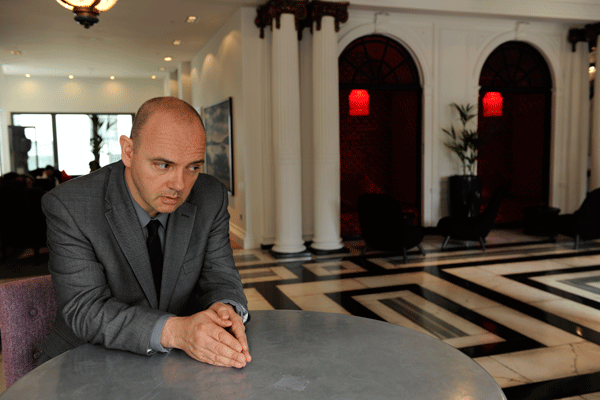Pat Kane, the one time pop star and activist talks about the big ideas behind FutureFest, the ‘Glastonbury of the Future’ he’s curated for Nesta. Get ready to hear about his job share with Edward Snowden, robots stealing arts funding and why artists need to get back to the future. Interview by Patrick Hussey.
Run-Riot: FutureFest has themes like Future Money, Future Global, Future Democracy – these seem more heavy weight than your average tech conference. Why?
Pat Kane: It isn’t just a tech conference, my background is in music and activism so we wanted to do something different. We call it a ‘A Glastonbury of the future’.
I’d describe FutureFest as a combination of TedTalks and immersive performances – we’ve also got workshops and seminars so people can dig in.
The themes are like dream catchers, helping people see what might be.
Run-Riot: Why are Nesta doing this kind of conference?
Pat: Blame Geoff Mulgan (CEO of Nesta). He’s an interesting sort… a failed Buddhist monk, he founded the think tank Demos that helped create New Labour. I knew him from Red Wedge era. He’s always been interested in future. We wanted to devise something fuller than normal tech conferences that included more of society and to help people think 20 years into the future.
Run-Riot: Why do you think it is important to talk about tech?
Pat: Well, just because we were promised hover boards and didn’t get them doesn’t mean there aren’t far, far deeper changes coming. We have to shape the future rather than let it shape us. I’m not a technological determinist but they are very strong drivers of our destiny. Real social issues will soon be created by tech. For instance what happens to White Van Man when the automated car comes in?
I think we’re in for a revival of that 70s argument about the 3-day week. And this isn’t just a Western, privileged issue. We’ll be having talkers from Lagos, from the Middle East – we need to hear the global perspective.
Run-Riot: So you think the question used to be should we seize the means of production, now we need to consider what happens when they become automated?
Pat: *wry smile* I think the question is what happens when they seize us?
There’s a great quote from Emerson. ‘Things are in the saddle, And ride mankind.’ We need to see tech as one of those riders. For me this conference is about humans wrangling with their own potential.
Run-Riot: One talk is titled ‘The Future of Creativity (In An Age of Automation)’ are you worried about robots stealing our arts funding?
Pat: We’ve got one speaker, Michael Osborne, who bought out a brilliant paper on the future of the machine over the next twenty to thirty years, speculating how they would affect employment. He believed the least automatable jobs came in the arts – and the ‘caring’ sector. Who knows? The carer and the aesthete may become the most valuable workers in our society. They might at last be pushed up the status ladder.
Run-Riot: Within the talks and themes is there any one subject that keeps cropping up? Such as AI or robotics?
Pat: Crypto.
Run-Riot: Talking of which tell us about Edward Snowden, what will he speak about at the conference? Have you spoken to him?
Pat: I thought to myself how do you get Snowden? I realised he and I share a status – he is the current rector of Glasgow University, I was in 1990. I asked for a contact to his lawyer and pitched to him as a fellow Rector.
He is a crypto supporter. There is a context of disillusionment with the web. What comes next, after this disillusionment caused by snooping, is important. Snowden feels cryptography is an answer to this and will become a part of the internet and our society.
Run-Riot: FutureFest says it’s not just about discussion but performance. Tell us about one of the performances.
Pat: I’m really looking forward to Minimaforms who I commissioned. They’re going to be creating an update on Plato’s Cave, one that looks at the rise of the Smart city. The piece will be an immersive and haptic conjecture on the ‘Emotive City’, exploring what happens when the city starts speaking to its citizens. Trust me, it will be uncanny.
Run-Riot: There is quite a heavy presence of artists at FutureFest. Why do you think they should be involved in discussing the future…rather than say money men or geeks?
Pat: We’re not an animal that sits happily in nature, we’re always looking for the next change, humans are futurists by default. Long before technologists, artists were exploring what that meant.
There’s something democratic about bringing artists in. Artists will give another view and perhaps help imagine a more cautious or even helpful future.
I also want FutureFest to be an argument against cutting arts – simply put they’re needed to humanise the future.
FutureFest
4-15 March 2015
Vinopolis, London
futurefest.org
Pat Kane
Pat Kane is a writer, musician, consultant and activist, based in Glasgow and London. He is the author of The Play Ethic (Macmillan, 2004), and has written for the Independent, the Sunday Times, the Observer and Scotland’s Sunday Herald, of which he was a founding editor in 1999. His forthcoming book is Radical Animal.
The Play Ethic is also an innovation consultancy that has worked with organizations like Lego, BT, BBH, Nokia, the UK Cabinet Office and The Scottish Government, Nesta, among many others.
Pat keynotes globally on the power of play, in the last few years presenting in New York, Washington DC, London, Istanbul and Budapest. He has spoken to many educators in the UK, the US and Australia about the role of play in educational reform. He is still one half of the 80’s pop duo Hue And Cry.
